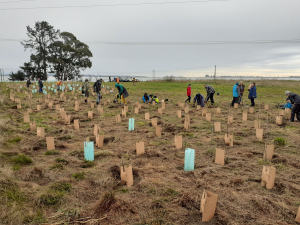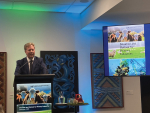A three-year project to support the restoration of a coastal estuary near Nelson is helping to accelerate other environmental projects.
“Approaching its final planting season, the Waimea Inlet Restoration Project is on track to exceed all project targets,” says Alex Wilson, director forest development, grants and partnerships at New Zealand Forest Service.
Wilson says Waimea Inlet is the largest semi-enclosed estuary in the South Island and is a significant site for many coastal birds and home to rare and threatened plants.
“With more than $1 million funding from the One Billion Trees programme, the project is aiming to plant over 70,000 native trees over 33 hectares, to reduce the ongoing negative impact of excess silt from land clearance, pollution and agricultural run-off.
“When this next planting season is over, the project will have exceeded its target, thanks to some fantastic work by the Tasman Environmental Trust who are managing the project,” she says.
Cost savings through both efficiencies and increased support from the project partners and the community has enabled the trust to purchase an additional 16,000 extra plants for the project.
“This is a huge boost to the project’s planting capacity, and a fantastic gain for the ecological health of the island, the estuary and its native species.”
Abby Boffa, operations manager, Tasman Environmental Trust (TET), says the One Billion Trees funding has helped to accelerate other habitat restoration projects around the estuary margins, ensuring that the “dream plan can become a reality”.
“The project has been the catalyst to increase the profile of habitat restoration around the Waimea Inlet,” says Boffa.
This year, planting will extend into two new areas, including 4 hectares of coastline on Moturoa (Rabbit Island). The other is the inclusion of the ecologically important Neimann Creek Wildlife Reserve.
Boffa credits the success of the project to exceptional support and contribution by the wider Tasman community.
Also key to the project is the collaborations with organisations like Tasman District Council, Nelson City Council, Department of Conservation (DOC), and community groups and local businesses.
"Hundreds of local people, of all ages, have jumped onboard the project and got involved. I think they have really enjoyed engaging with their natural environment through the project and will see the fruits of their labours expand exponentially as the Waimea Inlet estuary edge and riparian forests return," says Boffa.
"Waimea Inlet is a high profile taonga for the Tasman community, and the motivation to restore its native habitat values has grown considerably over recent years.
"There are many individuals, groups and organisations leading and delivering fantastic restoration projects, from private landowners, councils, and conservation entities like us, (Tasman Environmental Trust).
"These projects are making tremendous progress but are limited by the level of resource support available. This program has been about developing a whole of estuary approach that is enabling these projects to connect and scale up the restoration of the Waimea Inlet," Boffa says.
Work has continued with community planting days starting over the weekend and continuing every weekend until early September.











